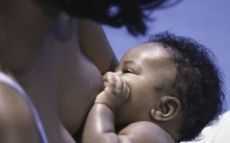| Breastfeeding mothers have been encouraged not to stop breastfeeding their babies over fears that they could pass on the novel coronavirus to their babies through the breastmilk. This is because COVID-19 cannot be transmitted from mother to child through the practice of optimal breastfeeding and Kangaroo Mother Care (KMC). In a statement, the Executive Director of RISE-Ghana, a health and development focused NGO based in northern Ghana, Mr Awal Ahmed Kariama, said as the world struggles to contain the coronavirus pandemic, mothers needed to be encouraged to practiced exclusive breastfeeding and KMC. He noted that many mothers were scared that in practicing exclusive breastfeeding and Kangaroo mother care, they might transmit the disease to their babies, hence many breastfeeding mothers were skeptical in breastfeeding their babies. He explained that “current evidence from the World Health Organisation (WHO), the World Alliance for Breastfeeding (WABA) and the latest breastfeeding guidelines from the Ghana Health Service points to the fact that, COVID-19 cannot be transmitted from mother to child through the practice of optimal breastfeeding and KMC.” Clifton Home Easter Promo GET CORONAVIRUS UPDATES HERE According to Mr Awal, the novel coronavirus (COVID-19) has threatened and exposed the weakness of our health systems and challenged the capacity of the world community to respond timeously and save lives. That, he said, all stakeholders must come onboard to initiate measures to promote and publicise and support mothers to adopt the proven low cost practices of exclusive breastfeeding and KMC to help save babies born to mothers that are confirmed or suspected to be COVID-19 infected. He said the WHO has recommended that “the COVID-19 virus has not been found in breastmilk,” and that the “Transmission of COVID-19 through breast milk and breastfeeding has not been detected to date. There is no reason to avoid or stop breastfeeding.” Clifton Home Easter Promo “In all socio-economic settings, breastfeeding improves survival and provides lifelong health and development advantages to newborns and infants. Breastfeeding also improves the health of mothers,” Mr Awal quoted WHO. Below is the statement COVID-19 DOES NOT SPREAD THROUGH BREASTFEEDING: HELP MOTHER BREASTFEED-RISE-GHANA. The novel coronavirus (COVID-19) has threatened and exposed the weakness of our health systems and challenged the capacity of the world community to respond timeously and save lives. As the world struggles to come to terms and contain the virus, RISE-Ghana wishes to urge all stakeholders to initiate measures to promote and publicize and support mothers to adopt the proven low cost practices of Exclusive Breastfeeding and Kangaroo Mother Care to help save babies born to mothers that are confirmed or suspected to be COVID-19 infected. Current evidence from the World Health Organization (WHO), the World Alliance for Breastfeeding (WABA) and the latest breastfeeding guidelines from the Ghana Health Service points to the fact that, COVID-19 cannot be transmitted from Mother to Child through the practice of optimal breastfeeding and Kangaroo Mother Care. For detailed case by case question and answer on the subject see: https://www.who.int/news-room/q-a-detail/q-a-on-covid-19-and-breastfeeding In summary, the WHO recommends among others the following: “The COVID-19 virus has not been found in breastmilk. Transmission of COVID-19 through breast milk and breastfeeding has not been detected to date. There is no reason to avoid or stop breastfeeding” “In all socio-economic settings, breastfeeding improves survival and provides lifelong health and development advantages to newborns and infants. Breastfeeding also improves the health of mothers”. Breastfeeding unquestionably reduces mortality in newborns and infants and provides numerous lifelong health and brain development advantages to the child. Mothers with symptoms of COVID-19 are advised to wear a medical mask, but even if this is not possible, breastfeeding should be continued. Mothers should follow other infection prevention measures, such as washing hands, cleaning surfaces, sneezing or coughing into a tissue. Non-medical masks (e.g. home-made or cloth masks) have not been evaluated. At this time, it is not possible to make a recommendation for or against their use. There are always risks associated with giving infant formula milk to newborns and infants in all settings. The risks associated with giving infant formula milk are increased whenever home and community conditions are compromised, such as reduced access to health services if a baby becomes unwell, reduced access to clean water and/or access to supplies of infant formula milk are difficult or not guaranteed, affordable and sustainable. The numerous benefits of breastfeeding substantially outweigh the potential risks of transmission and illness associated with the COVID-19 virus. The following are some justification to step-up breastfeeding and KMC in this time of COVID-19: The WHO recommendations on Kangaroo Mother Care, 2015 include the following: Kangaroo mother care is recommended for the routine care of newborns weighing 2kg or less at birth, and should be initiated in health-care facilities as soon as the newborns are clinically stable. This low-cost, low-tech and evidence-based method has proven to reduce neonates’ mortality to up to 33% in low-income countries. Evidence from WHO and UNICEF show that proximity with the mother facilitates breastfeeding, reduces risks of nosocomial infections (infections acquired in the hospital or health facility due to gaps in infection prevention and control (IPC) ), sepsis (by -47%), as well as length of hospital stay. Breastfeeding is the single most effective strategy for Child survival. Breastmilk Contains all the nutrients that a baby needs for the first six months of life. The colostrums contains antibodies, white cells, purgative properties, growth factors. Early initiation of breastfeeding can reduce global newborn deaths by 1.5 million deaths annually. Early initiation has also been proven to contribute to the following outcomes: Reduced neonatal mortality by 44% among all newborns, Reduced mortality by 42% among low birth weight babies and Reduced Infection-related mortality by 45%. |
| Source: Daily Graphic |

















